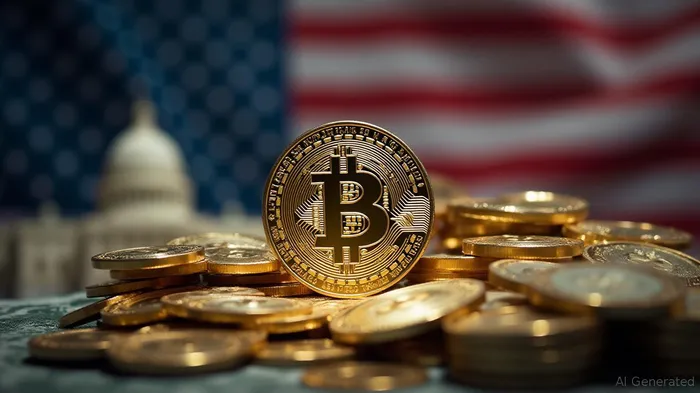U.S. Establishes Strategic Bitcoin Reserve Policy, Positioning Bitcoin as Key Financial Asset
The White House has taken a significant step in recognizing the strategic value of BitcoinBTC-- by establishing a Strategic Bitcoin Reserve Policy. This policy, mandated by President Trump's executive order in March 2025, aims to position Bitcoin as a key component of the nation's financial reserves. The move solidifies Bitcoin’s status as a reserve asset, potentially reshaping U.S. digital assetDAAQ-- policy and influencing global market dynamics. The Federal Housing Finance Agency is actively developing policies that would allow borrowers to include cryptocurrencies in their federal mortgage applications without the need for conversion to cash. This move underscores the growing acceptance of digital assets within the traditional financial system.
Three U.S. states have already enacted legislation permitting the use of public funds to purchase and hold Bitcoin as a reserve asset, with more states anticipated to follow. This legislative trend indicates a broader acceptance of Bitcoin as a strategic reserve, akin to gold. The establishment of a Strategic Bitcoin Reserve and Digital Asset Stockpile by the U.S. government, holding over $21 billion in confiscated cryptocurrencies, further emphasizes this shift. The reserve is designed to manage these assets independently from the general treasury system, reflecting a strategic view of Bitcoin as both an inflation hedge and a valuable financial asset.
The U.S. government's emerging strategy of positioning Bitcoin as a key component of its financial reserves is a notable development. This approach not only reflects a broader acceptance of digital currencies but also signals a potential transition of Bitcoin from a speculative asset to a recognized strategic reserve asset. The Federal Reserve's recent decision to remove the "reputational risk" rule from its supervisory framework further facilitates bank involvement with crypto, eliminating a barrier that previously hindered institutional adoption.
Texas has taken a leading role in this trend by establishing a $10 million Bitcoin reserve, becoming the first U.S. state to do so. Under the strategic Bitcoin reserve bill, Texas will manage its Bitcoin holdings independently from its general treasury system. This move sets a precedent for other states to follow, potentially leading to a wider adoption of Bitcoin as a reserve asset across the country. The strategic view of Bitcoin as both an inflation hedge and a valuable financial asset is evident in Texas's approach, which could influence other regions to adopt similar policies.
The U.S. White House has also hinted at a plan to accumulate Bitcoin, further solidifying its position as a strategic reserve asset. This transition from a speculative asset to a recognized strategic reserve asset fundamentally alters the market narrative around Bitcoin, positioning it alongside traditional reserve assets like gold. The acceptance of Bitcoin as a reserve asset by the U.S. government and various states signals a significant shift in the financial landscape, with potential implications for global financial markets and the broader adoption of digital currencies.
Many central banks globally hold gold as a safe-haven reserve asset. But now, the U.S. and other nations are also adding Bitcoin to their reserves. Bitcoin’s capped supply—only 21 million coins—gives it built-in scarcity, making it a powerful hedge against inflation. Unlike traditional fiat currencies that governments can print at will, Bitcoin’s supply curve is predictable and capped. In an era of unprecedented money printing and growing national debt, governments risk devaluing their currencies. Bitcoin offers a digital alternative. Its decentralized network and fixed supply mean it can’t be diluted through standard monetary policy. Countries are seeing it as a way to protect the value of their reserve holdings when inflation rises.
Gold is traditionally valued for its stability and physical presence. Bitcoin introduces similar qualities digitally—immense security from its blockchain, independence from any government, and rapid global transferability. These traits offer a new layer of resilience. The U.S. government's decision to establish a Strategic Bitcoin Reserve and Digital Asset Stockpile, holding over $21 billion in confiscated cryptocurrencies, further emphasizes this shift. The reserve is designed to manage these assets independently from the general treasury system, reflecting a strategic view of Bitcoin as both an inflation hedge and a valuable financial asset.

Quickly understand the history and background of various well-known coins
Latest Articles
Stay ahead of the market.
Get curated U.S. market news, insights and key dates delivered to your inbox.



Comments
No comments yet